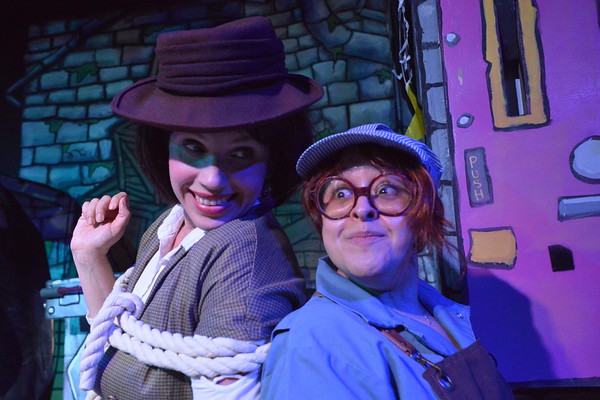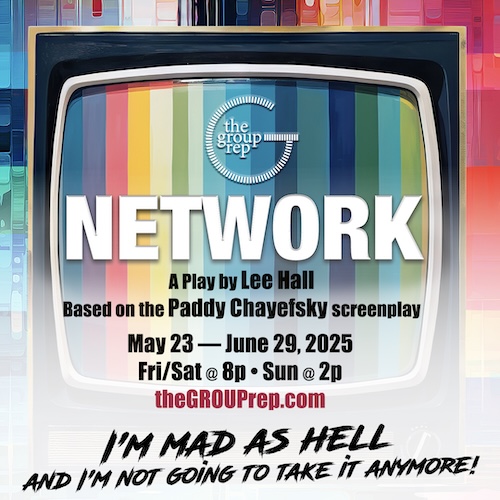
Photo courtesy of The Garage Theatre
Reviewed by Joel Beers
The Garage Theater
Through Dec. 21
Billed as a holiday melodrama, this show revels in surface-level antics, combining slapstick and melodramatic convention to spin a ridiculous, illogical story set in 1933 at the legendary Pike in Long Beach. It’s more cartoon than serious theater, with villains hatching harebrained schemes and virtuous heroes overcoming implausible obstacles to stop them
Yet beneath its preposterous plot and outlandish characters, there may be a far more subtle, and substantive story being told. It’s conveyed in just two lines, seemingly unconnected and unnecessary to the main narrative. To piece it together requires the viewer to create their own context and draw their own connections. It’s a lot to ask for a play that asks little of its audience but to lob felt tomatoes at the baddies and to lustily cheer each hero when they walk on stage.
But if considered, they suggest that a play set in what was once the pulsing heart of Long Beach might also be about the city’s soul, along with how globalization and commerce have shaped it, often at the expense of its identity, culture, and community.
Then again, that could be a terrible misreading of a play that gleefully embraces its lack of substance. Its loftiest perch is as the second part of a five-play cycle written by Garage founding member Jamie Sweet, set at various points in the first 50 years of the Pike’s history, when it grew from a small cluster of attractions on a tiny boardwalk in 1902 into the nation’s fifth-largest amusement zone by 1953. That’s where the cycle ends, so it doesn’t broach the Pike’s precipitous decline; within 20 years it was all but abandoned and wheezed to an official death in 1979.
If the other four plays are like this one, the darker corners of the Pike’s history are also not addressed. That’s because, while the Pike is a shared locale, its history only loosely inspired the events of his plays (writes playwright Sweet on the theater’s website).
But while we don’t get bootleggers, gambling, mobsters, or scandals, we do get Rod McGriddlebutt (played with zeal by Diana Kaufman), operator of the Pike’s prized Cyclone Racer roller coaster. Rod loves the Cyclone, but he’s worried that a new attraction — the titular rocket ride to the moon — threatens his beloved coaster. It turns out the ride is a front for a mad scheme to launch children to the moon and transform them into a super-army to conquer Earth. Naturally, Rod and his ragtag allies set off on a madcap adventure where good triumphs, villains are vanquished, and moral ambiguity doesn’t exist.
But then there are those two threadlines — one that comments on the past and the other on the present (a rigid allegiance to Aristotle’s unities this play does not have). They are delivered without gravitas and so matter-of-factly that it’s hard to remember who said them, or their context. But the more they are pondered, the more they appear to be a critique of how Long Beach has evolved over time and hint at the loss of its unique cultural identity.
The first of these remarks s that the Pike wasn’t just in Long Beach — it was Long Beach. The other throws shade on the entity that today uses the Pike’s name, a generic shopping mall called the Pike Outlets.
The Pike was chaotic, messy, lively, and a release valve in a city dominated politically by a conservative ethos that bordered on the puritanical. Though it was started by millionaire Charles Drake, it wasn’t planned from the top down by City Hall or a corporate board; it grew organically, and its identity was forged by scores of independent businesses, from fortune tellers and tattoo parlors to freak shows, vaudeville theaters, and thrill ride operators. But when the city stepped in during the 1950s to make it family-friendly, much of its appeal was lost. Today, it lives on only as a brand, severed from its history and community roots, used by a mall with restaurants and stores that can be found anywhere in America.
With a little imagination, that critique on Long Beach’s identity could extend to another Long Beach institution: the Port of Long Beach. Its growth makes it a vital node on the logistical mainframe of globalization, but it also reflects globalization’s dichotomy. The port’s economic impact on the city is more than the rest of Long Beach’s economy combined, but that wealth often facilitates, if not requires, cultural homogenization and the disruption of local communities. The Pike Outlets, dominated by chain stores, symbolize the first of these events; building a deep-water port, resulting in the eradication of a once-flourishing surfing community and environmental degradation, reflects the second.
Such losses — of identity, authenticity, and community — or the perceived threat of losing them — feed into broader cultural anxieties and help fuel the kind of identity politics that splinter communities. If we have any hope of achieving the kind of civil discourse essential to a healthy democracy, it won’t be driven by a directive from a corporate boardroom, pushing profit through campaigns that create the illusion of a sense of belonging or shared values, nor by movements that preach inclusivity but practice excluding those who don’t parrot their narrative. It will come from people freely gathering and communing, or sharing, values, perspectives, or experiences that connect them to others.
Ironically, that’s exactly what the Garage Theatre’s annual holiday melodrama achieves. By encouraging audiences to laugh, cheer, and boo together, it fosters the kind of organic connection often eroded by globalization and division. In celebrating shared joy and silliness, this ridiculous, unserious play delivers a poignant reminder: true community is forged from coming together, not falling apart.
The Garage Theatre, 251 E. 7th St., Long Beach; perfs resume Dec. 5: Thurs.-Sat., 8 pm; thru Dec. 21. https://web.ovationtix.com/trs/cal/553











